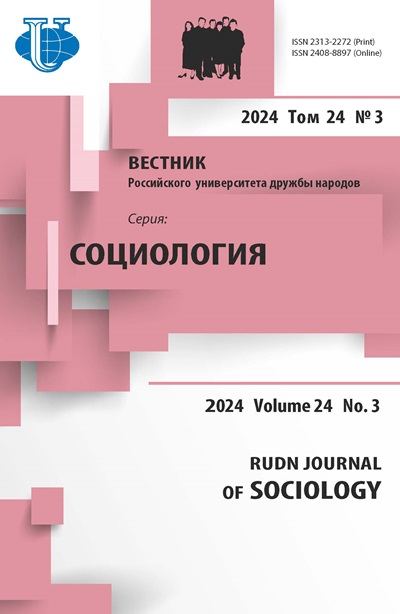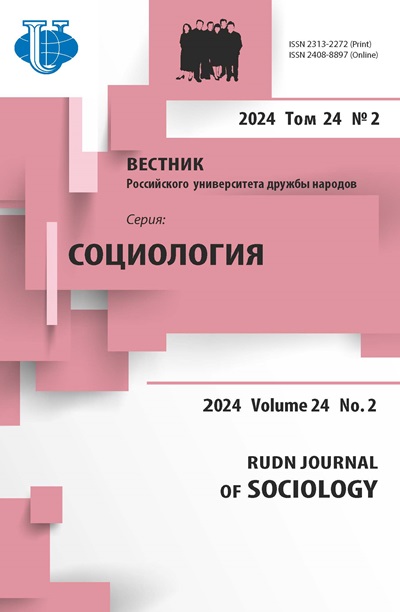Popular journalists and bloggers in the Russian media space: Trust and social perceptions of the audience
- Authors: Nazarov M.M.1, Ivanov V.N.1,2
-
Affiliations:
- Institute of Socio-Political Research of FCTAS RAS
- RUDN University
- Issue: Vol 24, No 2 (2024)
- Pages: 387-403
- Section: Contemporary society: the urgent issues and prospects for development
- URL: https://journals.rudn.ru/sociology/article/view/39932
- DOI: https://doi.org/10.22363/2313-2272-2024-24-2-387-403
- EDN: https://elibrary.ru/PMUURG
Cite item
Full Text
Abstract
Under the contemporary mediatization, the role of media figures in information processes has increased. Popular journalists and bloggers perform the functions of presenting and interpreting socially significant content, thus, competing for the attention and trust of the audience. The study of this role of media figures is of particular relevance, since the Russian media landscape, especially its online segment, is an open space in which actors promote different information agendas. The empirical study was conducted in Russia’s Central and Northwestern Federal Districts in April-June 2023. According to its results, the leading positions in the public trust ranking are taken by journalists and bloggers whose speeches are characterized by the state-patriotic orientation, but part of the audience seems to trust liberal content. The use of multidimensional classification procedures allowed the authors to identify some stable typological groups in the structure of the audience, differing in the set of trusted media figures, but groups that trust state-patriotic journalists and bloggers prevail. There are significant socialdemographic differences in the level of trust: journalists and bloggers with liberal orientations are supported mainly by young people, while journalists and bloggers with state-patriotic orientations - by representatives of the middle and older age groups. There is an increase in trust in liberal media as the financial situation of respondents improves. The authors also identified variables that increase the likelihood of trusting media figures: respondents’ ideological values; attitudes towards the Russian political system; the state support for democratic norms; perception of current social-economic issues. Social representations that correlate with trust in media figures reflect gaps in the “picture of the world” of certain social segments, which requires informed management decisions to consolidate society under the global challenges.
About the authors
M. M. Nazarov
Institute of Socio-Political Research of FCTAS RAS
Author for correspondence.
Email: vy175867@yandex.ru
Fotieva St., 6-1, 119333, Moscow, Russia
V. N. Ivanov
Institute of Socio-Political Research of FCTAS RAS; RUDN University
Email: vilen_ivanov@bk.ru
Fotieva St., 6-1, 119333, Moscow, Russia; Miklukho-Maklaya St., 6, Moscow, 117198, Russia
References
- Gorshkov M.K., Tyurina I.O. Konsolidatsiya rossiyskogo obshchestva v usloviyah sovremennyh vyzovov: istoriko-sotsiologichesky i tsennostno-mirovozzrenchesky konteksty [Consolidation of the Russian society under contemporary challenges: Historical, sociological and value-worldview contexts]. RUDN Journal of Sociology. 2023; 23 (4). (In Russ.).
- Diyakova E.G., Trakhtenberg A.D. Povestka dnya i informatsionnoe obshchestvo: sotsiologicheskie ocherki [Agenda and Information Society: Sociological Essays]. Moscow– Yekaterinburg; 2019. (In Russ.).
- Kasamara V.A., Sorokina A.A., Shilina A.N. Youtube-Blogery kak agenty politicheskoy sotsializatsii rossiyskih shkolnikov [Youtube bloggers as agents of political socialization for Russian schoolchildren]. Vestnik Moskovskogo Universiteta. Seriya 12: Politicheskie Nauki. 2021; 3. (In Russ.).
- Kolesnichenko A.V. Zhurnalistika i blogosfera: zhanrovo-tematicheskie peresecheniya [Journalism and the blogosphere: Genre-thematic intersections]. Vestnik Moskovskogo Universiteta. Seriya 10: Zhurnalistika. 2021; 1. (In Russ.).
- Lazutina G.V. Sotsialnaya rol zhurnalistiki v kontekste sovremennyh diskussiy [The social role of journalism in the context of current discussions]. Vestnik Moskovskogo Universiteta. Seriya 10: Zhurnalistika. 2016; 6. (In Russ.).
- Nazarov M.M., Ivanov V.N., Kublitskaya E.A. Media, instituty i doverie rossiyskih grazhdan [Media, institutions and Russians’ trust]. RUDN Journal of Sociology. 2019; 19 (2). (In Russ.).
- Okara A.N. “Chetvertaya vlast” mezhdu obshchestvom i gosudarstvom. Politicheskie zhurnalisty kak chast politicheskogo klassa sovremennoy Rossii [“The fourth estate” between society and the state. Political journalists as part of the political class in contemporary Russia]. Politiya. 2014; 3. (In Russ.).
- Obraz praviteley budushchego. Kakie lidery nas mogut ozhidat uzhe v blizhayshey perspektive? [Image of the future rulers. What leaders can we expect in the near future?]. 24.05.2017. URL: http://worldcrisis.ru/crisis/2702022. (In Russ.).
- Poluekhtova I.A. Televidenie i ego auditoriya v epokhu interneta [Television and Its Audience in the Internet Era]. Moscow; 2018. (In Russ.).
- Rossiyskoe obshchestvo i vyzovy vremeni. Kniga 5 [Russian Society and Challenges of the Time. Book 5]. Ed. by M.K. Gorshkov, V.V. Petukhov. Moscow; 2017. (In Russ.).
- Rossiyskoe obshchestvo i vyzovy vremeni. Kniga 6 [Russian Society and Challenges of the Time. Book 6]. Ed. by M.K. Gorshkov, N.E. Tikhonova. Moscow; 2022. (In Russ.).
- Firsov B.M. Massovaya kommunikatsiya v usloviyah nauchno-tekhnicheskoy revolyutsii [Mass Communication under the Scientific-Technological Revolution]. Leningrad; 1981. (In Russ.).
- Blobaum B. Trust and Journalism in a Digital Environment. Reuters; 2014.
- Digital News Report 2022. URL: https://reutersinstitute.politics.ox.ac.uk/digital-news- report/2022.
- Fletcher R., Cornia A., Nielsen R.K. How polarized are online and offline news audiences? A comparative analysis of twelve countries. International Journal of Press/Politics. 2020; 25 (2).
- Hindman M. The Internet Trap: How the Digital Economy Builds Monopolies and Undermines Democracy. Princeton; 2018.
- Peng Y., Yang T. Anatomy of audience duplication networks: How individual characteristics differentially contribute to fragmentation in news consumption and trust. New Media & Society. 2021; 24 (10).
- Richards R. Users, interactivity and generation. New Media & Society. 2006; 8 (4).
- Rubin A.M. Audience activity and media use. Communication Monographs. 1993; 60.
- Sánchez-Villar J.M. The use of blogs as social media tools of political communication: Citizen journalism and public opinion 2.0. Communication & Society. 2019; 32 (1).
- Suvakovic U.V., Narbut N.P., Trotsuk I.V. The youth of Russia and Serbia: social trust and key generational problems. RUDN Journal of Sociology. 2016; 16 (4).
- Thompson J.B. The Media and Modernity: A Social Theory of the Media. Stanford; 1995.
- Trotsuk I. “To trust or not to trust” is not the question; “How to study trust” is much more challenging task. Russian Sociological Review. 2016; 15 (4).
- Trotsuk I.V., Ivlev E.A. Few words on the high level of social distrust among the Russian youth: Civil servants’ social image. RUDN Journal of Sociology. 2016; 2.
- Usher B. The celebrified columnist and opinion spectacle: Journalism’s changing place in networked public spheres. Journalism. 2021; 22 (11).
- Vaccari C. Blogging, Political. International Encyclopedia of Political Communication. Ed by G. Mazzoleni. New York; 2015.
- Webster J.G. The Marketplace of Attention: How Audiences Take Shape in a Digital Age. Cambridge–London; 2005.
Supplementary files
There are no supplementary files to display.














